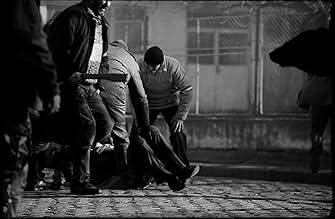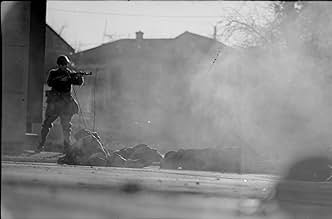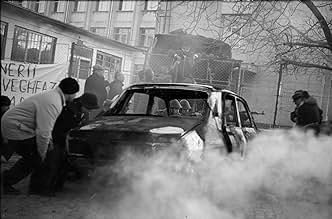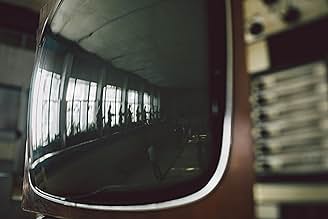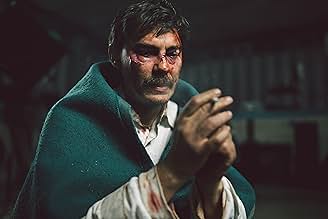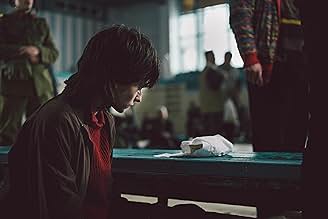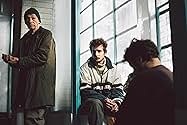Libertate
- 2023
- 1h 49m
ÉVALUATION IMDb
7,4/10
1,7 k
MA NOTE
Ajouter une intrigue dans votre langueDuring Romania's 1989 revolution, Sibiu witnesses a violent attack on a police station that spirals into armed clashes between soldiers, police, protesters and secret police.During Romania's 1989 revolution, Sibiu witnesses a violent attack on a police station that spirals into armed clashes between soldiers, police, protesters and secret police.During Romania's 1989 revolution, Sibiu witnesses a violent attack on a police station that spirals into armed clashes between soldiers, police, protesters and secret police.
- Prix
- 17 victoires et 10 nominations au total
Histoire
Le saviez-vous
- ConnexionsReferences Rocky (1976)
Commentaire en vedette
Romanian cinema, like a significant part of the Romanian society, is still obsessed with the events of December 1989, which led to the fall of communism. Romania was the last country among the former allies of the USSR in which this regime change took place and the only one in which the transition was violent. Neither historians nor courts nor ordinary people have yet given a clear verdict on those events: what really happened? Was there a popular uprising, a coup d'état, media stage, or a combination of all these? 'Libertate' ('Freedom'), the film directed by Tudor Giurgiu, focuses on what happened in Sibiu, a city that in 1989 had about 150 thousand inhabitants, located in Transylvania, in the geographical center of Romania. In a style that can be characterized as docu-drama, the film follows the struggles between the forces that until the eve had been allies in the preservation of communist order and legality, and which now find themselves - out of manipulation, out of inexperience, out of fear - engaged in - a violent conflict.
Tudor Giurgiu aimed and largely succeeded to create an immersive experience for the spectators, recreating the atmosphere of chaos in Sibiu on December 22, 1989 and in the ten days that followed. He created a gallery of characters in constant motion, most wearing army, militia or security forces uniforms. After some time, a few main characters emerge: Viorel Stanese - officer in the judicial militia who shows up for work and finds himself defending weapon in hand the institution's headquarters against an unclear enemy, Leahu - a taxi driver but perhaps also a security informant who finds himself with a gun in his hand at the wrong time, the army colonel Dragoman who evolves in days or maybe just hours from revolutionary to torturer. Almost all the characters had been collaborators and perhaps even profiteers of the old regime. The order imposed by the dictatorship collapses, everybody fears and suspects everybody else, some find themselves in the camp of the victors, others are categorized as 'terrorists' and become prisoners in a swimming pool emptied of water, along with some of the victims of the repression. In an anthological scene, protesting the conditions of detention, former militiamen and security officers chant 'Freedom!'. But what Freedom can we talk about after half a century of dictatorship? What does this word actually mean?
Tudor Giurgiu makes copious use, especially in the first part of the film, of the mobile camera, with the cameramen among the characters, in the crowds on the streets or next to the panicked officers in the besieged Militia headquarters. The second half of the film is spent most of the time in the structure of the swimming pool, an excellent visual metaphor of an enprisonment space. As things quiet down, so do the cameras and the cinematic style returns to a classic narrative. The swimming pool gradually empties as the prisoners are released, but the first to leave are those who agree to cooperate. The cast is excellent, the actors live their roles rather than act and the difference between documentary and fiction is almost completely erased. With this film, Tudor Giurgiu returns to the roots of Romanian history of the last 33 years. Without judging the characters and their actions and without taking explicit attitudes, he seems to suggest that the current disorientation of many segments of the Romanian society has its origin in the confusion of those December days. 'Libertate' is an intentionally chaotic film about those days of change that could have happened differently.
Tudor Giurgiu aimed and largely succeeded to create an immersive experience for the spectators, recreating the atmosphere of chaos in Sibiu on December 22, 1989 and in the ten days that followed. He created a gallery of characters in constant motion, most wearing army, militia or security forces uniforms. After some time, a few main characters emerge: Viorel Stanese - officer in the judicial militia who shows up for work and finds himself defending weapon in hand the institution's headquarters against an unclear enemy, Leahu - a taxi driver but perhaps also a security informant who finds himself with a gun in his hand at the wrong time, the army colonel Dragoman who evolves in days or maybe just hours from revolutionary to torturer. Almost all the characters had been collaborators and perhaps even profiteers of the old regime. The order imposed by the dictatorship collapses, everybody fears and suspects everybody else, some find themselves in the camp of the victors, others are categorized as 'terrorists' and become prisoners in a swimming pool emptied of water, along with some of the victims of the repression. In an anthological scene, protesting the conditions of detention, former militiamen and security officers chant 'Freedom!'. But what Freedom can we talk about after half a century of dictatorship? What does this word actually mean?
Tudor Giurgiu makes copious use, especially in the first part of the film, of the mobile camera, with the cameramen among the characters, in the crowds on the streets or next to the panicked officers in the besieged Militia headquarters. The second half of the film is spent most of the time in the structure of the swimming pool, an excellent visual metaphor of an enprisonment space. As things quiet down, so do the cameras and the cinematic style returns to a classic narrative. The swimming pool gradually empties as the prisoners are released, but the first to leave are those who agree to cooperate. The cast is excellent, the actors live their roles rather than act and the difference between documentary and fiction is almost completely erased. With this film, Tudor Giurgiu returns to the roots of Romanian history of the last 33 years. Without judging the characters and their actions and without taking explicit attitudes, he seems to suggest that the current disorientation of many segments of the Romanian society has its origin in the confusion of those December days. 'Libertate' is an intentionally chaotic film about those days of change that could have happened differently.
- dromasca
- 29 sept. 2023
- Lien permanent
Meilleurs choix
Connectez-vous pour évaluer et surveiller les recommandations personnalisées
- How long is Freedom?Propulsé par Alexa
Détails
Box-office
- Brut – à l'échelle mondiale
- 204 808 $ US
- Durée1 heure 49 minutes
- Couleur
Contribuer à cette page
Suggérer une modification ou ajouter du contenu manquant



